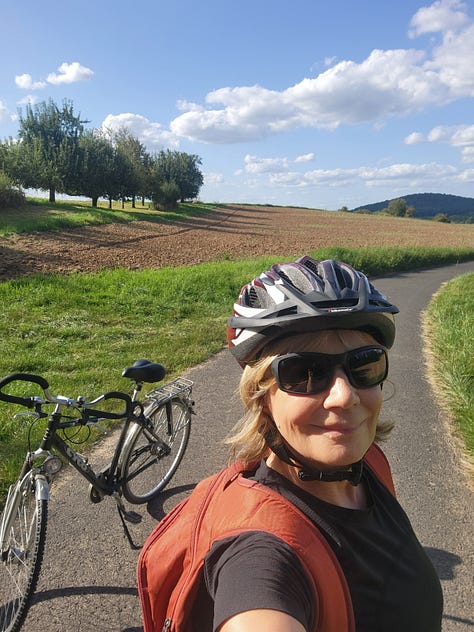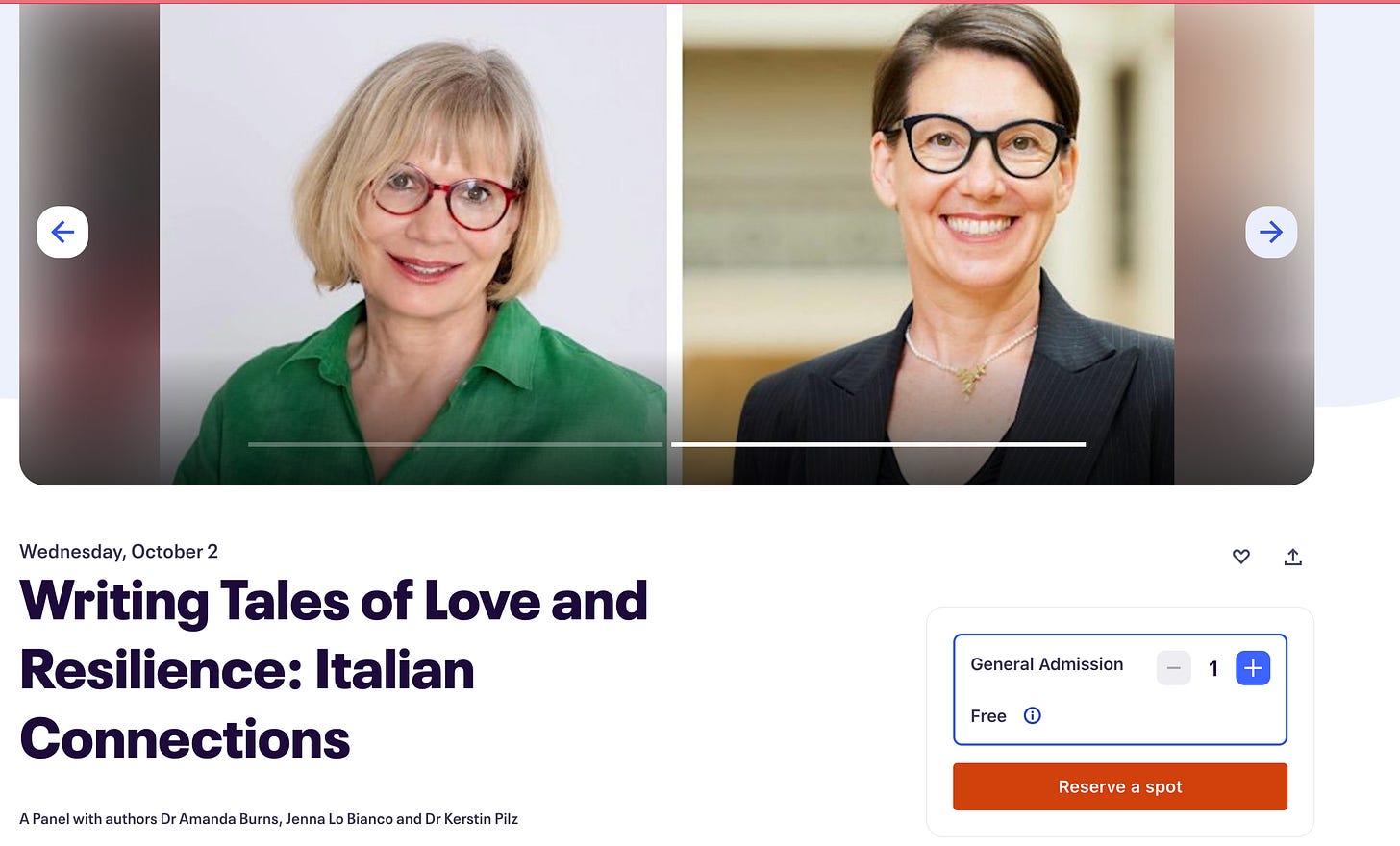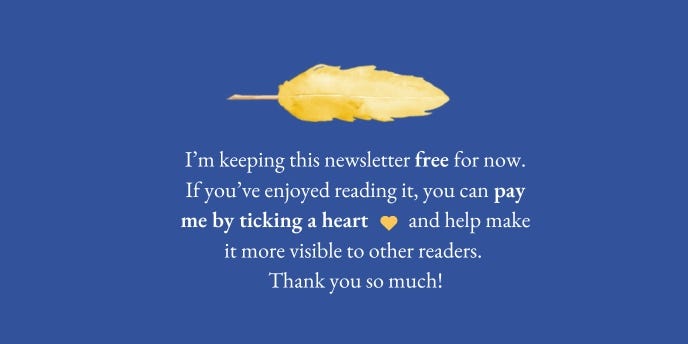How do you keep life in balance?
| SEPTEMBER NEWSLETTER | What is your source of joy? Reader Q&A: Writing about your own life. How do you write dialogue when you don't remember what was said? How do you find a title for your memoir?
Hello writer friend,
I hope you’re feeling good about the arrival of a new season. Autumn arrived in Germany with fog and frigid temperatures just as I was getting ready to return to Australia in spring, the season of change and growth.
Strangely, I’m not ready for spring, I don’t want to change and grow. Winter, the season of introspection and hibernation, only just ended here in Australia’s tropical Far North. So, I’m keeping the curtains drawn, pretending it’s still winter, binge watching Netflix, indulging my jetlag like it’s a never-ending cold.
Or maybe I just needed a week of doing nothing.
There is nothing wrong with taking time off to do nothing. It’s ok to stay in bed with a tub of icecream (when is the last time you did that?!). The hard part, for me, is to actually do nothing.
As a writer, binge watching Netflix is always also a form of research. BTW, if you haven’t watched it, The Perfect Couple is a masterclass in plot and narrative tension.



This week I am doing nothing by swimming 2 km each day, training for a competition, the mere thought of which makes me dizzy with panic.
So, I’ve been asking myself some deep questions. Why do I do these things? Why do I put myself through the terror of a competitive swim in a frigid lake when I am woefully under-prepared? Do I need to punish myself in order to experience joy? Is that how everybody does it or is it just me?
Which led me to asking, What actually gives me joy? What is my source of happiness and how do I keep it all in balance?
These are questions we all ask at some point. Seeing that we’re entering the final quarter of the year this weekend, I thought it might be a good time to reflect in our monthly writing prompts on what brings us joy, what makes us happy, what makes us feel balanced and what needs to change.
“The soul's joy lies in doing.” —Percy Bysshe Shelley
Shelley is right. My soul is filled with joy when I am doing something that gives me meaning and purpose. But getting the balance right isn’t always easy.
How about you? Is your life in balance? How is your work/life balance? What gives your soul joy?
Writing? Slowing down? Being active in nature? All three? How do you balance what gives you joy?
Set a timer (5-10 minutes), choose one of the following prompts and write without thinking or editing:
What gives your soul joy?
What is out of balance in your life?
What is one thing you can do today to bring your life more into balance?
If joy were a place, what would it look like?
Please share in the comments what came up for you and help me get the conversation going!
I listened to a lot of podcasts by the philosopher Alain De Botton while wandering the forests around my parents’ house. He makes philosophy accessible and relevant to every day life and he challenged me to think deeply about a lot of things, including the idea of a ‘work-life balance’. What if it doesn’t exist?
“There is no such thing as work-life balance. Everything worth fighting for unbalances your life.”
― Alain de Botton
Writing gives me joy (and pain), but it’ll always be worth fighting for, despite the fact that it unbalances my life.
How about you?
What unbalances your life?
What is one thing you can do today to bring your life back into balance?
What is worth fighting for in your life?
How will it unbalance your life?
What are your tips for finding a better work/life balance? Please share in the comments!
“Sometimes your joy is the source of your smile, but sometimes your smile can be the source of your joy.”
― Thich Nhat Hanh
I had the great privilege of spending time in the presence of the late Zen master Thich Nhat Hanh at Plum Village Thailand and I continue to seek his advice, because it’s concise and to the point. Sometimes it’s as easy as asking:
What is the source of your joy today?
And sometimes the answer is as easy as a smile.
Events in October
One of the things that gives me joy is talking to readers about my book. If you’re in Melbourne next week, please join me at my alma mater, Melbourne University, on Wednesday October 2 at 6:00 pm for a panel discussion about Tales of Love & Resilience: Italian Connections with fellow alumni, authors Dr Amanada Burns (An Italian Affair, 2023) and Jenna Lo Bianco (Love & Rome: Love Triangles, Wine And Pasta, 2024) . This is a FREE event, but please register here.
I’ll also be back in Bali next month (thankfully it’s only a 4.5 hour flight from Cairns) to launch my memoir at the Ubud Readers’ and Writers’ Festival! If you happen to be in Bali next month, please join me on October 26 in the Elephant room at 4pm.
It’s 6 months today since my memoir Loving My Lying Dying Cheating Husband (Affirm Press) was published and a small top-up run has been printed so that you can get your copy!
Reader Questions
I got a lot of questions about memoir last month. Good thing I am passionate about memoir, as it took me years to understand how to shape my personal story into an engaging memoir that a publisher might take on. So, let me make it easier for you by sharing what I’ve learned.
QUESTION 1:
I'm not famous, but my life has been ‘one for the books’ and I’d like to write about it—so many facets in many places and various careers along with meeting famous and regular people. But how do I find a title?
I love this question even though I am surprised that this reader didn’t ask ‘How do I structure my personal story as a book?’ or ‘Will anybody want to read, let alone publish, my story given that I am not famous?’ Those are important questions I asked myself before I started, as should every new writer of autobiographical stories (provided your aim is to get published). Learning how to sum up the story I wanted to write from real life events in a one to two-sentence statement, my uniquely relatable premise (we explore what that is in one of the workshops we offer on retreat), helped me find the structure of my book organically.
As for the title of your memoir or your lifestory, that’s the last question you should ask yourself. Write the book first, then worry about the title. If you’re lucky enough to get a publisher (if that’s your goal), chances are that the title will be decided by them, not you.
That’s what happened to me. Like this reader, I spent a good amount of time worrying about a title long before I had completed a first draft. Falling Apart Gracefully was the title I settled on after many months of pondering when I could have been writing. But referring to my shitty first draft by a proper title helped me believe in myself as an author. It helped to make the intangible—turning a messy story into a book that has a beginning, a middle and an end—into something concrete. It made my dream of publishing my story a little more real.
My title resonated with friends and strangers and I was convinced I’d nailed the perfect title. But when the unthinkable happened, when after my very first pitch I got a publishing contract from my dream publisher, Affirm Press, I had to accept the uncomfortable truth, that my title wasn’t a winner. Far from it. If I were famous, my editor said, it could work. But since I am not, my title was simply lame and also fundamentally inaccurate. Because there wasn’t anything graceful about the way I fell apart after learning that my dying husband had also been a lying cheater. And my memoir isn’t just about the messy falling apart bit, it also traces my journey of making myself whole again.
A few months after signing my contract, my publisher sent through the title their team, which included representatives from the marketing, sales and publicity sections, had come up with. Loving a lying, dying cheater.
I nearly cried. There was no way I could live with that title. It sounded offensive to my dead husband, like I’d written a tell-all revenge memoir, when I’d carefully crafted a story of redemption. And the word ‘cheater’ pronounced in my German accent sounded like ‘cheetah’. It was a disaster and for a moment I seriously considered pulling out of the contract.



It took some carefully worded emails by my caring editor to get my head around it. Ruby explained that the sales and marketing team had loved the ‘lying, dying’ turn of phrase I’d used in my pitch to get across that this wasn’t a pity memoir about grief, but a story of redemption written with a pinch of humor. She also explained that given that I was an unknown, new author, the book needed a catchy title that summed up the uniquely relatable premise of my book. The sole purpose of a title, she explained, is to get people to pick it up a book, turn it over to read the blurb in order to find out what the book is actually about and hopefully to be intrigued enough to purchase it.
I could see the logic and I reluctantly relented, under the condition that the word ‘cheater’ be removed. The sales team was adamant that the word needed to stay, since the cheating part was the bit that would intrigue readers the most. A compromise was struck and Loving My Lying, Dying, Cheating Husband became the title that caught everybody’s attention.
A month after publication, Caroline Overington, the editor of the Literary Review of The Australian (a leading Australian newspaper) told me that she’d picked my book out of a pile of two hundred books because of the title. She flew up to Cairns to interview me for a four-page spread in the glossy weekend magazine. The title had worked its magic. Of course my publisher had been right. I accepted that while it’s my job to write, it’s a publisher’s job to sell books and ultimately to decide the final title.
So, don’t worry about your title, come up with a good working title, and concentrate on writing your book!
QUESTION 2:
I am retired and decided to write a book about the interesting life I’ve led. Some days I feel I am going nowhere because I have no dialogue to include, because the events are so long ago, I can’t remember what was said. What do I do to create dialogue?
Another great question. First of all, nobody expects you to remember the exact words that were spoken when you were five, twelve or twenty-five. Dialogue in memoir or autobiographical lifewriting, just like in fiction, is constructed. You are framing ideas as dialogue in order to move the story along, to bring your characters alive and to engage the reader. This doesn’t mean you have poetic license to distort the truth. Rather, you’re interpreting and narrating what could, conceivably, have been said, staying faithful to your personal memories and the intentions, actions and tone of voice of the people portrayed in your book. So don’t be afraid, as they say, to put words into someone’s mouth, including your own, but always make sure you stay true to the speaker’s intent.
Spend some time learning how to use dialogue effectively—ie. dialogue should serve to advance the action, it’s not a container for lengthy backstory and it’s most effective if it’s snappy, so learn how to condense. In real life we don’t finish our sentences, we speak over each other, we loose our train of thought, we use filler words, we make small talk ‘Hi, how are you?’ ‘I’m well, thanks. How are you?’ On the page that’s boring. Make your dialogue short, sharp and poignant, get in late (ie. skip all the small talk, the umms and uhhs) and remember that dialogue serves to advance the narrative and to create narrative drive (more on narrative drive in this episode of our podcast Let’s Talk Writing).
Make sure you get the tone right. Did the speaker in real life have an upper class, a regional or a working class accent? Did they have a sense of humor? Emulate it on the page, but don’t go over board with accents. Take a look at my memoir. My husband and I always spoke Italian at home and he had a very strong Italian accent when he spoke English. On the page I stayed clear of making him speak with an accent, as it would have been tedious for the reader (and for me to write). Instead, I sprinkled a few carefully chosen Italian words and phrases throughout his dialogue.
My other piece of advice is, as always, to read, read and read some more in order to learn how other authors have constructed dialogue in their autobiographical writings. Take a look at Frank McCourt’s celebrated memoir Angela’s Ashes about the author’s impoverished childhood in New York and Ireland. He wrote the book at the end of his life after he’d retired. Whilst it’s fair to assume that he remembered the gist of what was said and the tone in which it was delivered, ie. the vernacular of the Irish working class, I doubt that he would have recalled exactly what was spoken back when he was a child. And yet, he managed to bring alive a world he’d lived in decades before, touching the hearts of millions of readers.
So, my best advice is to read heaps, learn how dialogue works, write lots and don’t be afraid to make it up!
And of course, invest in yourself by joining one of our writing retreats and take advantage of our extended 15% launch discount!
Is writing is a source of your joy? Is it the passion that is worth fighting for? Will taking time off to do something for yourself balance your life?
If you’ve been on the fence about joining one of our retreats, now is a good time to invest in your joy and fight for your passion. Sign up by September 30th and a 15% discount will be applied automatically (we’ve also scrapped the GST for now, so it’s gotten even cheaper!).
If Tuscany is calling you, here’s something to sweeten the deal: hook up with a friend, book a double room together and receive a whooping 20% off! (only applies to our Italy retreat).
Our retreats will inspire you to write, to have fun and to learn new tricks. Many of our guests form life-long friendships, some form their own writing group, others go on to pitch winning books. You won’t regret investing in your joy! Any questions about our retreats, please hit reply.
And please keep your reader questions coming.
Wishing you a balanced October, filled with joy!
With many blessings,
PS: follow my journey on Instagram @kerstinpilz.author.



15% off until September 30. GST has also been scrapped, so it’s even cheaper now!
Heavenly Hoi An (February 10 - 16, 2025)
Blissful Bali (June 23 - 29, 2025)
Incredible Italy (10-17 October, 2025) Book a double room with a friend and get 20% off (each).














I love de Botton’s quote. The things worth fighting for do unbalance us. When my focus is the writing, when a story overtakes my thinking, nothing else in life matters. In. 2022 my word for the year was balance. I spent six months of that year with vertigo, literally fighting for balance. It is the unbalanced times that cause us to reflect. When things are on an even keel we can get lost in the doing.
Great newsletter. Love the Q & A! xx